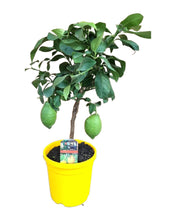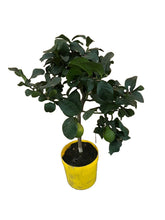Citrus × limon, commonly known as the lemon tree, is a popular and productive citrus fruit tree prized for its tart, juicy fruits and fragrant blossoms. This evergreen tree features glossy, dark green leaves and produces fragrant white flowers, often with a purplish tinge, followed by oval-shaped, yellow fruits with a characteristic acidic flavour. Lemons are widely used in culinary applications, beverages, and cleaning products, and the essential oil extracted from the peel is used in aromatherapy and perfumes. It belongs to the Rutaceae family.
Origin: Citrus × limon is a hybrid species, likely originating from a cross between Citrus medica (citron) and Citrus aurantium (bitter orange). Its exact origin is unknown, but it is believed to have originated in the region between India, Burma, and China.
Light: Citrus × limon thrives in full sun. It prefers at least 6-8 hours of direct sunlight per day to encourage healthy growth and fruit production.
Water: Water regularly, especially during hot, dry periods. Allow the soil to dry out slightly between waterings, but avoid letting it dry out completely.
Soil: Citrus × limon prefers well-drained, slightly acidic soil. It thrives in fertile, loamy soil with a pH between 6.0 and 7.0.
Fertilising: Feed your Citrus × limon with a citrus fertiliser in spring and summer.
Temperature: Citrus × limon is not frost-tolerant and should be protected from cold temperatures. It can be grown in a container and brought indoors during the winter months.
Pruning: Prune your Citrus × limon in late winter or early spring to shape the tree and remove any dead or crossing branches.
Pests and Diseases: Keep an eye out for common citrus pests and diseases, such as scale and aphids.
Uses: The fruits of Citrus × limon are widely used in culinary applications, beverages, and cleaning products. The juice is used to flavour dishes and drinks, the zest is used for baking and cooking, and the essential oil extracted from the peel is used in aromatherapy and perfumes.
Toxicity: Citrus × limon is not known to be toxic to humans. However, the leaves and unripe fruits contain psoralens, which can cause skin irritation in some individuals. The plant is also toxic to dogs and cats if ingested, causing vomiting, diarrhoea, and potentially more serious symptoms. Keep lemon trees out of reach of pets.



